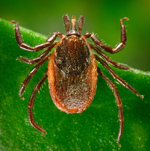Research Activities
Basic research to better understand the relationship of vectors with their environment, with the pathogens they transmit, and with their vertebrate hosts is an important component of the program. Currently, the Vector Biology Research Program includes international and domestic research activities based in the laboratory as well as in the field.
|

|
| An adult female western blacklegged tick, Ixodes pacifus, has been shown to transmit Borrelia burgdorferi, the agent of Lyme disease. (Photo courtesy of the CDC) |
Proof- of-concept research, where a target for a potential insecticide/repellent, for example, has been identified and needs to be validated, is also part of the portfolio. The development of devices that would improve our ability to collect, trap, and identify vectors is also of interest.
Partnerships between academia and industry to move potential vector control products from basic research into an initial translational research phase are of interest. However, the implementation of the use of such products is outside of the scope of this program.
Examples of vector research supported by NIAID include the development of transgenic mosquitoes that will be unable to transmit pathogens; the study of physiological functions, including blood digestion, oogenesis, and energy metabolism; the discovery of novel targets for vector control; and the relationship between vectors and their environment as well as the pathogens they transmit.
NIAID does not support operational aspects of vector control or surveillance. Research on mechanical vectors of pathogens (i.e., house flies, cockroaches) and arthropods used as model organisms (i.e., Drosophila, moths) also are not supported by NIAID.
back to top